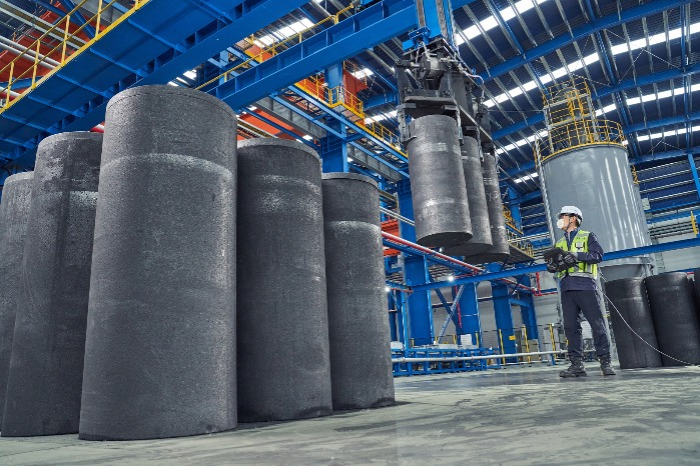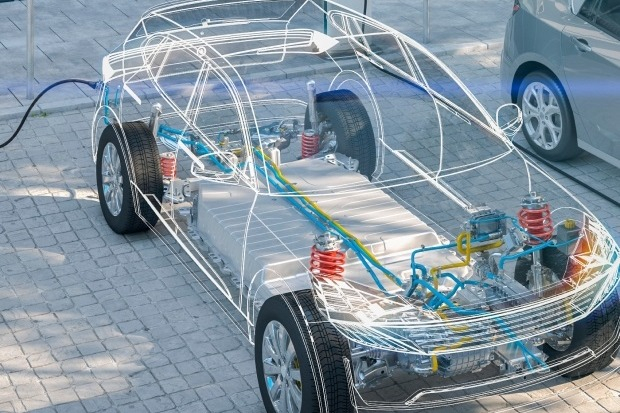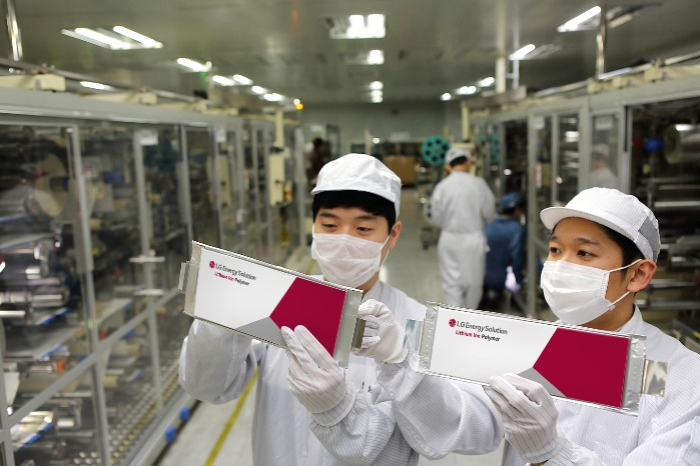Batteries
China’s graphite export curbs deal blow to Korean battery sector
The South Korean EV battery industry heavily relies on China for graphite imports, which account for about 95% of its needs
By Oct 20, 2023 (Gmt+09:00)
3
Min read
Most Read
LG Chem to sell water filter business to Glenwood PE for $692 million


KT&G eyes overseas M&A after rejecting activist fund's offer


Kyobo Life poised to buy Japan’s SBI Group-owned savings bank


StockX in merger talks with Naver’s online reseller Kream


Meritz backs half of ex-manager’s $210 mn hedge fund



South Korean electric vehicle battery and battery component makers are fretting over the Chinese government’s impending restrictions on exports of graphite, a critical mineral used in virtually all EV battery anodes.
Beijing on Friday announced that it will require export permits for some graphite products to protect national security.
Under the new rule, Chinese graphite exporters must obtain permits as of Dec. 1 to ship two types of graphite, including high-purity, high-hardness and high-intensity synthetic graphite material, and natural flake graphite and its byproducts.
China’s export curbs on graphite, a key material of an EV battery’s core component anode, could put the brakes on Korean battery and component makers’ business expansion considering that Korea heavily relies on China for its graphite supply.
KOREA’S HEFTY RELIANCE ON CHINESE GRAPHITE
Korea imported $79.1 million worth of synthetic graphite from January to September of this year, of which about 95% was shipped from China, according to the Korean government.
“It is almost impossible to find alternatives to Chinese graphite imports,” said an official of a Korean EV battery maker who declined to be named. “The Korean EV battery plant operations will hinge on the Chinese government’s export controls.”

EV battery component makers echoed the battery manufacturing industry’s concerns.
“We are trying to learn the details of the (graphite) expert permit application process,” said an official from POSCO Future M Co., Korea’s major EV battery component provider. “If it takes longer than expected to receive (graphite) after submitting the permit, our production could be disturbed.”
After Beijing placed similar export restrictions on two chip-making metals, gallium and germanium, on Aug. 1, the county shipped none of those materials for all of August.
POSCO Future M is known to have two to three months' worth of graphite inventory.
Korea has three top-tier EV battery makers supplying their batteries to major global EV makers, such as Hyundai Motor Group, General Motors Co. Stellantis NV and Volkswagen Group.
Korea’s No. 1 EV battery maker LG Energy Solution Ltd. commanded the largest share of 28.5% in the global battery market excluding China in the first eight months of this year, according to SNE Research. Its battery usage jumped nearly 60% from the same period last year.
The other two Korean battery majors SK On Co. and Samsung SDI Co., respectively, controlled the fourth and fifth-largest share in the market.
They use key battery components like anodes and cathodes from Korean suppliers such as POSCO Future M.

The Korean government will continue to discuss with the Chinese government to ensure Korean companies can receive permits for graphite exports without delay or rejection, said an official of Korea’s Ministry of Trade, Industry and Energy in response to China’s export curbs on graphite.
CHINA, THE WORLD’S TOP GRAPHITE PRODUCER AND EXPORTER
Graphite is a critical material used in anodes, the key component of EV batteries.
As the Chinese government’s export control of graphite comes after the US government’s decision to widen its restrictions on Chinese companies' access to semiconductors earlier this week, many suspect Beijing’s graphite ban is a retaliatory action.
China’s commerce ministry said the move was to “ensure the security and stability of the global supply chain and industrial chain and protect national security and interests.”
It added that the move is not targeting any specific country. Besides Korea, Japan, the US and India are also major importers of Chinese graphite.
The newly added three types of “highly sensitive” graphite products had already been under temporary controls, the commerce ministry said.
The Korean battery industry is keeping an eye on whether China will tighten graphite export restrictions so much that it effectively bans its exports.
The world’s second-largest economy, which has been embroiled in diplomatic and trade rows with the world’s largest economy US, is the top producer of 33 minerals out of 55 critical raw materials, according to the EU report.
Write to Ji-Hoon Lee and Jae-Fu Kim at lizi@hankyung.com
Sookyung Seo edited this article.
More to Read
-
 BatteriesKorea’s battery trio aims to outsmart Chinese rivals in US
BatteriesKorea’s battery trio aims to outsmart Chinese rivals in USOct 16, 2023 (Gmt+09:00)
3 Min read -
 EarningsLG Energy Q3 profit at record high on gains from US battery tax credit
EarningsLG Energy Q3 profit at record high on gains from US battery tax creditOct 11, 2023 (Gmt+09:00)
3 Min read -
 BatteriesLG Energy barely fends off CATL in global EV battery market
BatteriesLG Energy barely fends off CATL in global EV battery marketOct 13, 2023 (Gmt+09:00)
3 Min read -
 BatteriesBattery cell prices plummet amid supply glut in China, weak EV demand
BatteriesBattery cell prices plummet amid supply glut in China, weak EV demandSep 15, 2023 (Gmt+09:00)
2 Min read -
 BatteriesKorea EV cell materials firms race for silicon anode market
BatteriesKorea EV cell materials firms race for silicon anode marketFeb 07, 2023 (Gmt+09:00)
2 Min read -
 BatteriesPOSCO Chemical breaks ground on second anode material plant
BatteriesPOSCO Chemical breaks ground on second anode material plantFeb 01, 2023 (Gmt+09:00)
1 Min read
Comment 0
LOG IN


